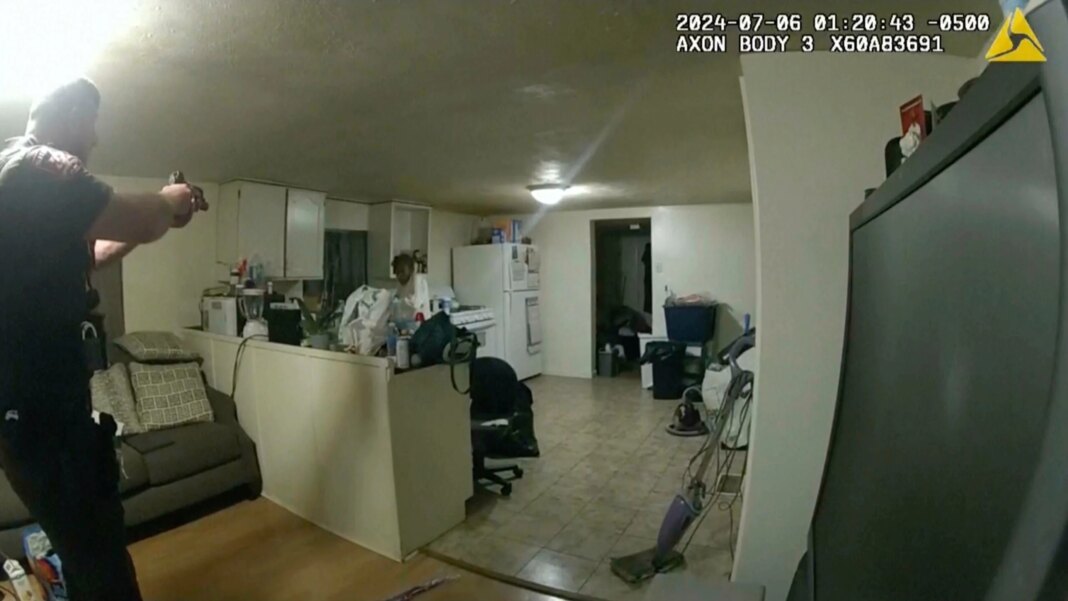The Trial of Sheriff’s Deputy Sean Grayson: An Unfolding Tragedy
Introduction to the Case
In Peoria, Illinois, a profound legal battle is underway as a jury deliberates in the first-degree murder trial of Sheriff’s Deputy Sean Grayson. The case centers around the tragic death of Sonya Massey, a 36-year-old Black woman who, in a moment of crisis, called 911 for help, only to become the victim of lethal force within her own home.
The Incident That Sparked National Attention
On July 6, 2024, Sonya Massey made an emergency call, reporting a prowler outside her home. When Deputies Grayson and another officer arrived, they found a seemingly tense situation in Massey’s kitchen, where she was managing a pan of hot water. Surveillance and body cam footage reveal a complicated and tense interaction. Initially light-hearted banter between Grayson and Massey quickly spiraled into chaos as Grayson ordered her to drop the pan and threatened to shoot her.
The Dynamic of the Interaction
Massey’s defense lawyer emphasized her vulnerability during their exchange. As Grayson yelled at her to drop the pot, she responded with, “I rebuke you in the name of Jesus,” before ducking behind a counter. The courtroom witnessed the heart-wrenching reality of the situation: a woman, frightened and cornered, simply trying to manage her own household. As Mary Beth Rodgers, Sangamon County’s First Assistant State Attorney, noted, Massey made it clear she wanted no confrontation, yet the aggression escalated tragically.
Arguments from the Prosecution
The prosecution’s narrative painted a stark picture of the events leading to Massey’s death. They argued that Grayson violated Massey’s safety by escalating a situation that was already fraught with tension. The crux of the argument is that even as Massey complied, fear dominated her actions, showcasing a disregard for her safety. “He has no right to go into her kitchen,” Rodgers argued, capturing the essence of Massey’s need for shelter from an angry man with a weapon.
Defense Strategy: A Different Perspective
In a striking choice, Sean Grayson took the stand in his defense, arguing from a perspective of perceived threat. He testified that he considered using a Taser but ultimately drew his firearm out of a belief that Massey posed a danger. Defense attorney Daniel Fultz urged the jury to view Grayson’s actions through the lens of the moment, suggesting that hindsight should not dictate the outcome. Fultz emphasized Grayson’s immediate fear of danger, which he felt warranted his response.
Complicated Testimonies and Perspectives
The trial further unfolded as conflicting testimonies emerged. Deputy Dawson Farley, the partner on the scene, viewed the situation differently. He reported not feeling threatened by Massey and expressed confusion about Grayson’s reaction, admitting he had initially stated to investigators that he felt threatened by the hot water.
The Larger Conversation on Law Enforcement
Massey’s death ignited a significant dialogue about police conduct, particularly concerning the use of deadly force against Black individuals in their homes. The severe implications of this case resonate beyond Peoria, raising critical questions about accountability in law enforcement. The high-profile nature of the incident necessitated relocating the trial due to concerns about pre-trial publicity, highlighting the need for a fair and impartial trial process.
Possible Outcomes and Sentencing
The jury faces a grave responsibility as they deliberate on Grayson’s fate. He stands accused of first-degree murder, which carries a possible life sentence. Alternatively, they may consider a lesser charge of second-degree murder, which could result in significant—but comparatively lesser—penalties of four to 20 years or probation.
Final Thoughts on the Ongoing Case
As the jury continues their deliberations, the case of Sonya Massey highlights the complex intersections of race, law enforcement, and the rights of individuals in their own homes. The outcome of this trial holds the potential not just for justice for Massey, but also for broader implications in the ongoing discourse about policing, accountability, and community safety in America.



